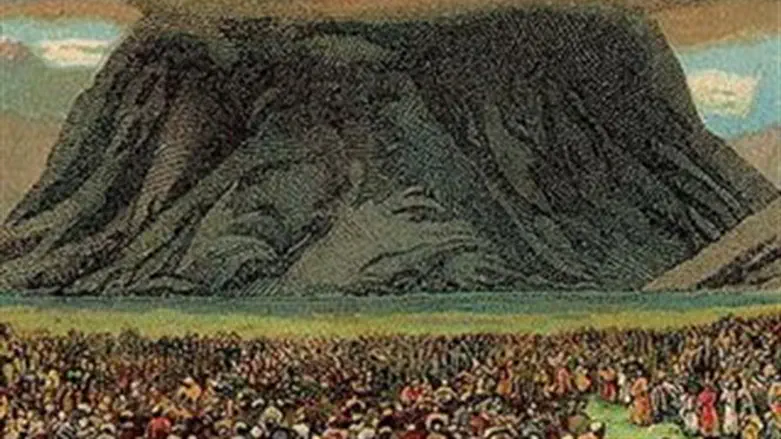
We read in our Parasha (19:1):ביום הזה באו מדבר סיני:’On this day they arrived at the Wilderness of Sinai’, as a prelude to the wondrous revelation at Sinai, מעמד הר סיני, which culminated in Bnei Israel receiving the Torah.
The Ohr Hachaim Hakadosh lyrically expounds:’The arrival describes the meeting of the lover and the beloved. Heaven and earth both rejoiced that this day had arrived at last’.
By referring to the ‘lovers’ in the singular, the sage may well be alluding to the wondrous unity that Bnei Israel attained, at this historic moment.
As our Parasha relates:(19:2)’They journeyed from Rephidim..ויחנו: and they encamped in the Wilderness, ויחן שם ישראל נגד ההר: and Israel’- in the singular!- ‘encamped there, opposite the mountain’.
Our Sages comment:’THERE Israel encamped’, as one man and with one heart- ‘but all the other encampments were made in a murmuring spirit and with a spirit of dissension’.
The Kli Yakar deepens our understanding, of this singular event, by noting several ‘changes’ in the choice of words in our Parasha, culminating with ‘our’ change- from the plural to the singular.
He expounds:’These come as proof, that Bnei Israel were not deserving to receive the Torah until there was peace between them, because ‘all of its paths are peace’- when there is dissension, one permitting and one forbidding, it seems, כביכול, that there are two Torahs.
‘This is further alluded to by the Torah being given in the third month, whose sign is תאומים: the twins, signifying love and closeness; that each should be תמים: ‘whole’, with the other, as only then there will be peace.
‘Their ‘arrival to the Wilderness of Sinai’, contributed to their unity, for the tendency to seek honor and superiority- which is the root cause of all strife - was ‘uprooted’ there, when they saw that Hashem chose the lowest of all mountains- Har Sinai- for His abode.
‘They thereby adopted the attribute of humility, which leads to peace - and to being ‘as one man with one heart’’.
The Chatam Sofer adds a beautiful insight to this, from the words:’And they camped כנגד ההר’: literally, ‘against the mountain’.
‘To receive the Torah, there has to be unity; and, to be in unity and peace, humility and forbearance are required - ‘mountain’ alludes to haughtiness, and this is the allusion in the words:’They encamped AGAINST the mountain’, in opposition to haughtiness, in humility, and this led to peace’
Rav Avigdor Nebenzahl adds:’That 600,000 men were so ‘as one’, that, without any consultation between them, they were all able to accept and to declare- in the plural-‘all that Hashem says, we will do, and we will obey’- like a man who is able to accept on behalf of all his limbs’.
Our Sages, in the Talmud Yerushalmi, bring a beautiful thought on this very imagery, to expound on the prohibition (Kedoshim 19:18):’You shall neither take revenge nor bear a grudge against the members of your people; you shall love your neighbor as yourself’.
‘If, whilst using, you inadvertently cut your other hand, would it come to your mind that the injured hand should seek revenge on the hand that held the knife?
‘So too, Bnei Israel are enjoined as one man, to love their fellow Jews, and not to seek revenge one from the other, nor to bear him hatred, as this would be like taking revenge, or hating, one’s self.
‘’Loving your neighbor as yourself’, says Rabbi Akiva, is a great principle in the Torah’.
Concludes Rav Yosef Salant:’Since so many Mitzvot in the Torah are based on this Mitzvah - amongst the Mitzvot between man and man - they can only be fulfilled if you imagine your fellow Jew as being, כביכול, one of your own limbs.
‘Therefore, until Bnei Israel had attained the level of being as ‘one man with one heart’, they could not receive the Torah’.
Now, say our Sages:’When ויחן שם ישראל: ‘when ‘Israel camped against the mountain’- it does not say ויחנו שם ישראל- THEY camped, but ויחן שם- in the singular, said Hakadosh Baruch Hu:’Now is the time that I give the Torah to My son’.
Our Parasha continues immediately:(19:3)ומשה עלה אל האלקים: ‘Moshe ascended to G-d’.
The Siftei Kohen comments :’When Moshe saw that they were ‘with one heart’, he joined with them, and was himself elevated, knowing that they were now worthy to receive the Torah.
‘How did he know this? From the incident of the Burning Bush, when Hashem said:’And I descended to save him’- he did not say ‘to save THEM’, but ‘him’.
‘Since they now reached this wondrous unity, Moshe too was elevated, as Hashem said to him:(Brachot 32.)’Have I not given you greatness, only for the sake of Israel’.
‘Just as Moshe was ordered (Ki Tissa 32:7): לך רד כי שחת עמך: ‘Go, descend’, when Bnei Israel transgressed with the Golden Calf, so too, now, that they were elevated, so too: ‘Moshe ascended’’.
לרפואת נועם עליזה בת זהבה רבקה ונחום אלימלך רפאל בן זהבה רבקה, בתוך שאר חולי עמנו.